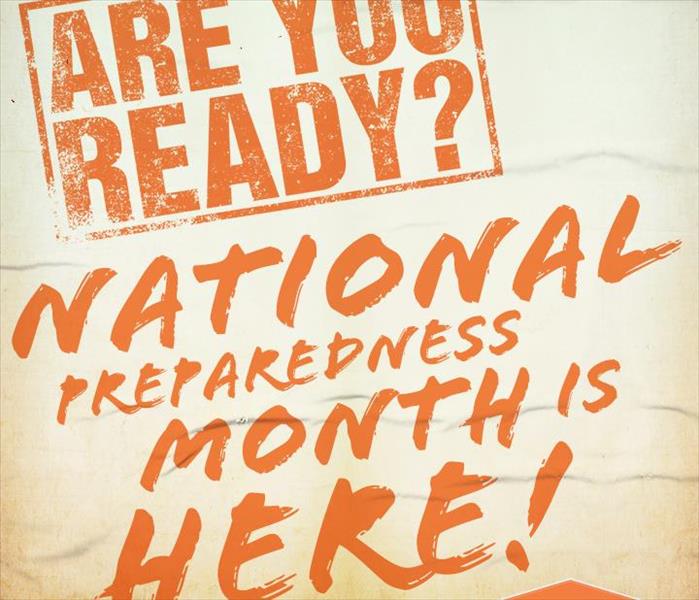Emergency Preparedness Tips
9/16/2020 (Permalink)
There are a few days every year that make you stop and think, “Today makes all the cold days of winter worthwhile”. For me, those are days look like a morning following an afternoon/evening summer thunderstorm. The ground is still wet, the cloth mat on the back patio step still damp from the rain, and everything is a bright shade of green. You can’t help but take a few moments to watch the birds picking through grass, squirrels bustling up and down trees, and the neighbor’s dog lazily wagging its tail on the front steps. A day like this deserves time set aside to center oneself and appreciate the small things that make it truly special.
For as many beautiful days as we have, Iowa’s uncertain weather keeps us on our toes. On those days, sometimes it is all we can do to keep from thinking about how our homes, families, and other responsibilities will fare through the chaotic stress of the situation. With a little planning, we can remind ourselves that this too, will pass.
The first step of any planning is to set a goal. Why are you making a plan? What will the plan accomplish? Keeping our families safe is the primary goal for most emergency preparedness plans. For me, keeping my wife and our three beautiful cats safe is my priority. Secondary to them, our home is next on the list of importance. Here are some tips for crafting your own plan.
1) Have an emergency kit. It should have a radio (and spare batteries!), basic first aid items, and enough bottled water for your family for a few days. Some basic non-perishable food items are also beneficial, no one thinks or acts well on an empty stomach. Consider adding an extra set of clothes, a flashlight with extra batteries, a deck or two of playing cards to help combat stress.
2) Designate a storm shelter. This is where you keep your emergency kit or at least consider keeping the kit within quick access of this shelter. Good storm shelters will be in a basement, and if not, an interior room with few to zero large exterior windows. During a storm with heavy wind gusts, tree branches or other debris may blow around and could potentially break glass windows. The storm shelter will also ideally be able to accommodate your family in close quarters comfortably.
3) Store outdoor items to prevent loss. If inclement weather is likely, keep as much of your exterior furniture inside and be sure to park your vehicle in your garage or under a roof or shelter, if possible. Hail and strong winds can cause significant damage, so it is best to store items to prevent damage in the first place.
4) Storage for indoor items must be waterproof. Keeping basement or ground level items stored in waterproof containers may help prevent damage if water accumulates inside your home. Some of the best scenarios of flood cleanup SERVPRO has seen have relied heavily upon the preparedness of their homeowners. When your items are secured in waterproof containers, it is much easier to clean the container than try to dry and save potentially sensitive items that have been exposed to water directly.
5) Make sure to keep home landscaping trimmed. If a tree limb is growing over a house, and that limb is torn off during a storm, it is likely to cause damage to the home underneath. By trimming these types of tree limbs ahead of time, you can help control the hazards to your home and property during storms.
6) Consult with your insurance agent regarding coverage. Often times coverage isn’t updated or even inspected after the policy is first signed. Make an annual reminder to at least talk over your policies and make sure that you have the coverage that best suits your needs. Flood coverage & sewer back-up are often separate from what is covered in a generic homeownership policy. Be sure to have a conversation with your agent regarding options for adding more coverage for such events.
7) Pay attention to the weather. Our weather professionals are trained and equipped to predict storms well in advance. Capitalize on their expertise by doing your part and keeping up to date on current and future weather conditions. This can help you determine how best to stay safe during storms.
8) Make THE list! Last, but certainly not least, make a list of emergency service contacts ahead of time and keep that list easily available for your family. We suggest adding SERVPRO of Decorah to your list after 911, emergency, and non-emergency numbers of local police, hospitals, and fire departments. Ask your insurance agent how best to contact them if a loss occurs after hours. Plumbers, contractors, and other essential services would be an asset on such a list. It’s always handy to have a good list of contacts available for easy reference when you’re dealing with a stressful situation!
A little planning can go a long way to preventing stress and fear. SERVPRO will always be there to help on those days when the chaos is too much. Better yet, let us help you prepare. As is the case with so many things, an ounce of prevention is worth a pound of a cure.
Ask about our Emergency Ready Plans (ERP) for your home or business.
From all of us at SERVPRO of Decorah, we encourage you to enjoy each day and taking a few minutes here and there to help prepare for days that aren’t quite as calm as others.




 24/7 Emergency Service
24/7 Emergency Service
